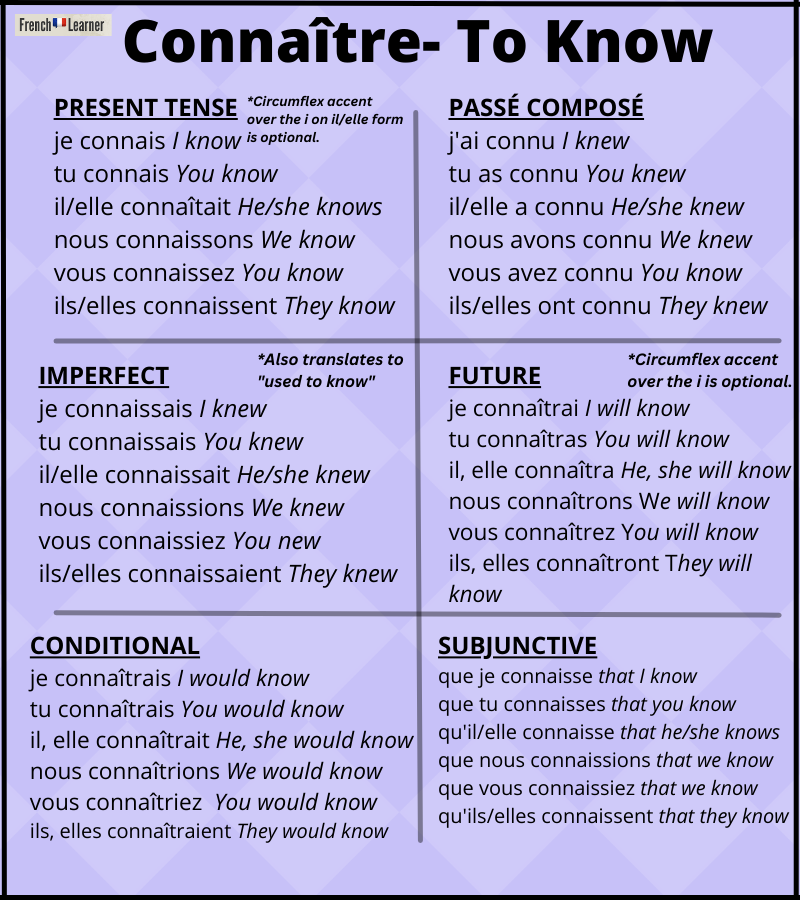The conjugation of connaître (Meaning: To know) is: Je connais (I know), tu connais (you know), il/elle connaît (he/she knows) nous connaissons (we know), vous connaissez (you know) and ils/elles connaissent (they know). This page provides conjugation tables of connaître in six verb tenses.

Connaître is an an irregular -re verb. This means that its endings in the present tense are different from all other regular -re verbs.
The past participle of connaitre is connu (met) and the present participle is connaissant (knowing).
The meaning of connaître is to know in the context of knowing a person, place or area of study. However, savoir means to know in the context of knowing facts.
This page on our site covers connaître vs. savoir in detail and this page offers complete conjugation tables with example sentences for savoir.
This page provides conjugations with example sentences in the following six major verb tenses:
- Present tense (le présent)
- Compound past (passé composé)
- Imperfect (l’imparfait)
- Simple future (le futur simple)
- Conditional (le présent du conditionnel)
- Present subjunctive (le subjonctif)
Connaître conjugation table

Connaître conjugation charts
Present tense (le présent)
In the present tense, je connais translates to “I know”)”.
| Je connais | I know | Je connais Jacques mais je ne connais pas Marie. | I know Jacques but I don't know Marie. |
| Tu connais | You know (familiar, singular) | Est-ce que tu connais Monsieur Dupont? | Do you know Mr. Dupont? |
| Il, elle connaît | He, she knows | Il connaît bien Paris mais il ne connaît pas Rome. | He knows Paris very well but he doesn't know Rome. |
| Nous connaissons | We know | Nous connaissons la région depuis très longtemps. | We've know the region for a very long time. |
| Vous connaissez | You know (formal, plural) | Vous connaissez le patron de l'entreprise. | You know the company's boss. |
| Ils, elles connaissent | They know | Ils connaissent très bien l'histoire française. | They know French history very well. |
In the following video, online French teacher Alexa teachers the pronunciation of connaitre in the present tense.
Compound past (passé composé)
The French use the passé composé to describe past events which occurred at specific times. In the passé composé, j’ai connu translates to “I knew” or “I met”.
| J'ai connu | I knew, I met | J'ai connu ma petite amie à l'université. | I met my girlfriend in university. |
| Tu as connu | You know, you met (familiar, singular) | Où est-ce que tu as connu Marie? | Where did you meet Marie? |
| Il, elle a conne | He, she knew, met | Il a connu sa femme il y vingt ans. | He met his wife twenty years ago. |
| Nous avons connu | We knew, we met | Nous avons connu nos amis en France. | We met our friends in France. |
| Vous avez connu | You knew, you met (formal, plural) | Vous avez connu Jean chez votre ami. | You met Jean at your friend's place. |
| Ils, elles ont connu | They knew, they met | Ils ont connu Martin dans l'avion. | They met Martin in the plane. |
Imperfect (l’imparfait)
The French use the imperfect tense to describe past actions which occurred at unspecified times. Je connaissais translates to “I used to know”. The verb connaître does not lend itself well to example sentences in the imperfect tense.
| Je connaissais | I used to know |
| Tu connaissais | You used to know (informal, singular) |
| Il, elle connaissait | He, she used to know |
| Nous connaissions | We used to know |
| Vous connaissiez | You used to know (formal, plural) |
| Ils, elles connaissaient | They used to know |

Simple future (le futur simple)
The French uses the simple future tense to express future actions. Je connaîtrai translates to “I will know”.
| Je connaîtrai | I will know | Je connaîtrai toutes les grandes villes de l'Europe. | I will know all the big cities of Europe. |
| Tu connaîtras | You will know (informal, singular) | Tu connaîtras l'amour de ta vie. | You will know the love of your life. |
| Il, elle connaîtra | He, she will know | Il connaîtra un grand succès. | He will know a great success. |
| Nous connaîtrons | We will know | Nous connaîtrons bien l'histoire de la Chine. | We will know the history of China very well. |
| Vous connaîtrez | You will know (formal, plural) | Vous connaîtrez beaucoup de nouveaux endroits. | You will know many new places. |
| Ils, elles connaîtront | They will know | Ils connaîtront tous les bons coins de la réigon. | They will know all the good spots in the region. |
Conditional (le présent du conditionnel)
The French use the conditional tense to express hypothetical actions. Je connaîtrais translates to “I would know”. The verb connaître does not lend itself well to example sentences in the conditional tense.
| Je connaîtrais | I would know |
| Tu connaîtrais | You would know (informal, singular) |
| Il, elle connaîtrait | He, she would know |
| Nous connaîtrions | We would know |
| Vous connaîtriez | You would know (formal, plural) |
| Ils, elles connaîtraient | They would know |
Present subjunctive (le subjonctif)
The French use the subjunctive mood to express wishes, emotions and doubts. Que je connaisse translates to “that I know”.
| que je connaisse | that I know | Il doute que je connaisse cette femme. | He doubts I know this woman. |
| que te connaisses | that you know (informal, singular) | Je suis content que tu connaisses le patron. | I'm happy you know the boss. |
| qu'il/elle connaisse | that he, she knows | Je ne sais pas s'il me connaisse. | I don't know if he knows me. |
| que nous connaissions | that we know | Il faut que nous nous connaissions un peu mieux. | We have to get to know each other a bit better. |
| que vous connaissiez | that you know (formal, plural) | Je ne sais pas si vous vous connaissiez. | I don't know if you know each other. |
| qu'ils connaissent | that they know | Je suis ravi qu'ils connaissent notre ville. | I'm delighted they know our city. |



